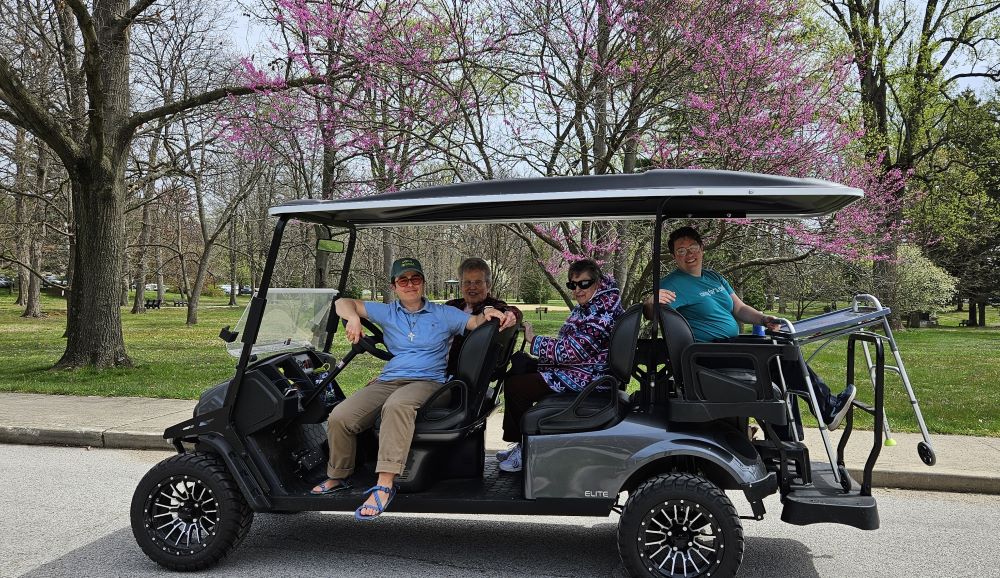
Sr. Emily TeKolste transports sisters to an eclipse-watching party at the campus of the Sisters of Providence of St.-Mary-of-the-Woods, Indiana, on April 8. (Courtesy of Emily Tekolste)
During the April 8 solar eclipse, my community's motherhouse and the nearby city where I live were both in the path of totality. I took the day off from my primary ministry so that I could be as present as possible to this very unique experience.
Our community's White Violet Center for Eco-Justice hosted a "Party in the Pasture," where sisters, staff, friends and others who shared our campus joined the chickens and alpacas for sun and moon-themed snacks, good company and the eclipse. I ended up helping sisters make their way to the pasture, finding creative ways to load both sisters and their rollators onto golf carts and helping them to make their way safely to a seat in the pasture.
And as they often do, some of our older sisters took this opportunity of encounter to shower some of us younger sisters with so much love that they have for us.
As we gathered, one sister's father had set up a telescope with the sun projected onto a box, where we could see — in addition to the eclipse — some sun spots. Her biological sisters also came; they had a box that could project the sun in shadow form as well.
I watched as one sister struck up a conversation with a family that came from out of town and landed on our campus because they just decided that "St. Mary-of-the-Woods sounded like a good place to watch." The sister talking to them had the chance to explain who we were as Catholic sisters, as they didn’t seem to have much context for where they'd landed — building a bridge of understanding and encounter.
As we approached totality, the energy began to shift. I found myself paying less attention to the sun and more to the quality and feel of the air and light around me. The colors of the air started to shift and the temperature cooled noticeably. I began pondering how this experience might have felt a few hundred years ago, when the people didn't know what to expect or how to explain what was happening. I can only imagine how confusing it would have seemed, this once-in-multiple-lifetimes event.
And suddenly, the moon completely covered the sun and we could look directly at it without protective eyewear. The light crept out around the edges of the moon, creating a big black hole in the center of our vision.
The chickens were frozen, as if night had come so suddenly that they didn't have time to return to the safety of their homes. The people were staring upward in awe. For about three minutes, we got to look at and experience the thing that many people there had driven hours to experience — and it was worth every second.
And then it began to recede. The strange quality of the air on the side of coming out after the eclipse didn’t seem quite as intriguing to those around me. Sisters began to move toward home, and my work of helping to shuttle them back began again. Slowly, things returned to normal, and by the next day I was back to my normal ministry.
On the morning of April 8, before the eclipse, I was at a meeting with a few other sisters where one sister remarked, "If only we had more events like this to bring people together."
Advertisement
As I was pondering this column, I had originally expected to write about the recent conversation on white supremacy and American Christianity that we hosted over the weekend in my ministry at Network. While it is certainly of the utmost importance that we grapple with the truth of where we are, we must also look for and engage in moments of awe and moments of community.
During conversation on white supremacy, the moderator, Joan Neal, who is Network's deputy executive director and chief equity officer, asked about where we go from here in moving toward "beloved community." Fr. Bryan Massingale, author of Racial Justice and the Catholic Church, responded, "I'm glad you framed it in terms of the beloved community because I do think that sometimes we can become so passionate about what we're against, the dangers we face, that we're not equally passionate about what vision we have."
He then outlined a path of repentance and truth-telling that sets us free to choose to move in another direction. It's not that we can avoid the painful truth by focusing only on vision, but we can't leave that out either. In the end, we are an Easter people, a people of resurrection on the other side of the death and destruction that white Christian nationalism has brought on our society and our world.
For many of us, the eclipse gave us a vision — a reminder — of what these moments of community with all of creation can look like. Remaining rooted in that sense of community, possibility and awe keeps us grounded for the long-haul work of transformation that we're called to.
You may not be able to host an eclipse party anytime soon, but in what ways can each of us work to build more community, joy and awe into our lives and the lives of those around us? I truly believe that those moments have more power to change the world than we can begin to imagine.
Who do you need to invite to your party in order to help break down the barriers that society has erected between us? Who do you need to invite to your party so that it models a vision of a society where all people — Black, brown or white, Native or newcomer — are thriving?






